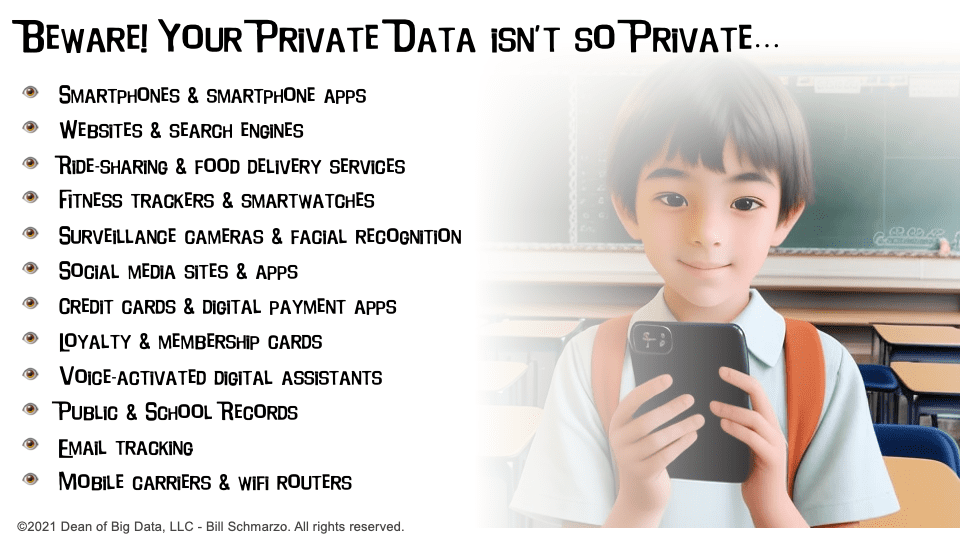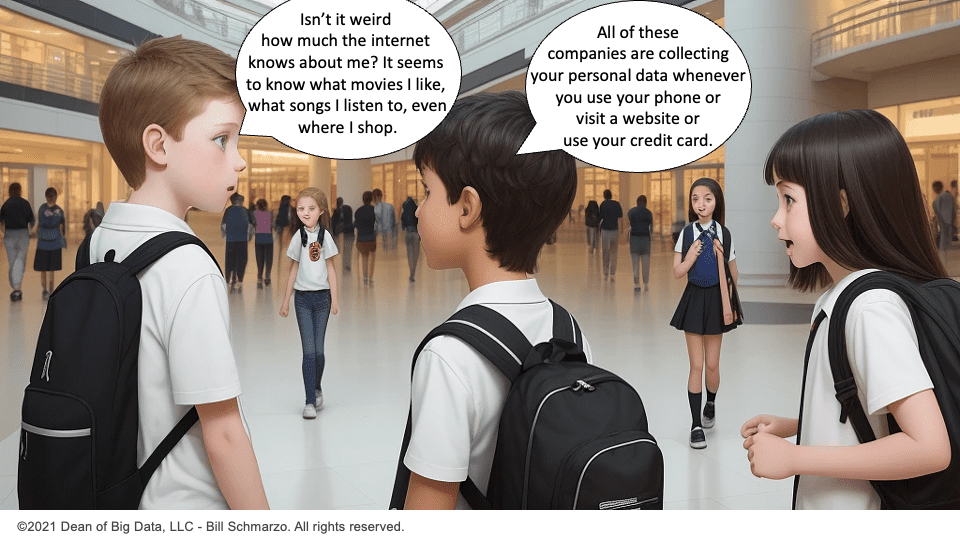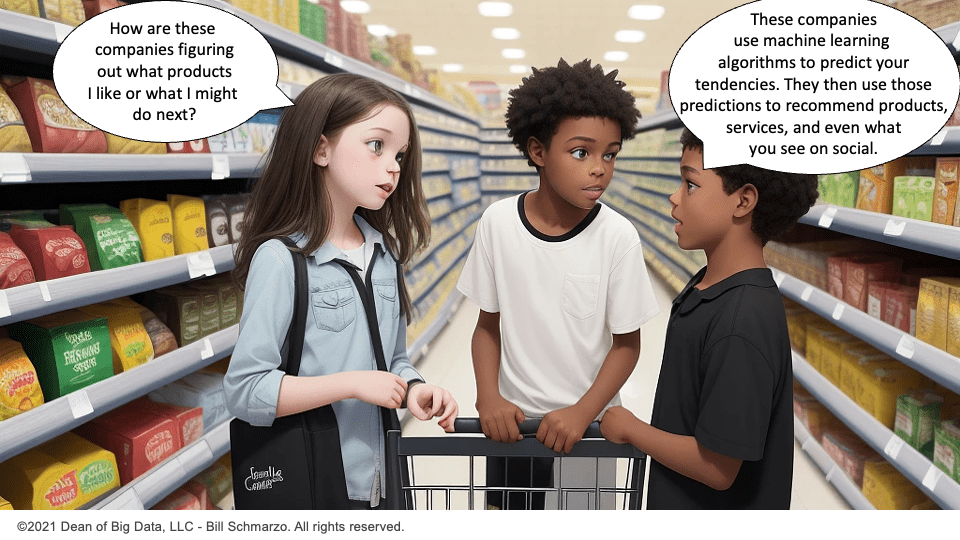
I recently wrote the book “AI & Data Literacy: Empowering Citizens of Data Science” to help non-data scientists – which is most of the world – understand the risks associated with how companies capture and use your personal data to influence your viewing and buying habits… and even your political and societal beliefs. And while I have gotten great feedback on my mission, I’ve also realized that I am missing a critical audience – grade schoolers and preteens.
Consequently, I wanted to create a short yet engaging blog for that audience to ensure that our future leaders are aware and prepared for tomorrow’s world of AI and data.
Your Digital Fingerprints

You’re watching a movie on cable or streaming service – and they are capturing your personal data. You’re playing your favorite video games on your phone or tablet – and they are capturing your personal data. You’re sharing your thoughts on last night’s basketball game on social media – and they are capturing your personal data. You’re walking through the mall – and they are capturing your personal data.
It seems that every organization is after your personal data. And your personal data isn’t just your name, address, phone number, email address, age, and gender. Companies are also collecting data about your interests, preferences, relationships, and much more from a wide variety of everyday sources, including:
- Smartphones and smartphone apps
- Websites and search engines
- ChatGPT, Bing AI, and Dall-e
- Uber Eats, Grubhub, and other home delivery services
- Uber, Lyft, and other ride-sharing services
- Fitness trackers and smartwatches
- Surveillance cameras and facial recognition
- TikTok, Instagram, Snapchat, and other social media apps
- Credit cards and digital payment apps
- Loyalty programs
- Voice-activated digital assistants like Siri and Alexa
- Smart home devices and appliances
- Public and school records
- Email tracking
- Mobile carriers & wifi routers
What are Companies Doing With Your Data?

Companies are using Artificial Intelligence (AI) and machine learning algorithms to mine your personal data to create a digital profile that they will use to recommend products, movies, food, TV shows, and even friends that they think you might like. They want you to buy their products, watch their movies, play their video games, and read their content. At times, it’ll seem like these companies know more about you and what you want than you even know about yourself. It can be very disturbing and confusing.
What Are The Risks?

Companies can use your personal data to manipulate you by showing you ads and content designed to influence your actions, selections, decisions, behaviors, and even your beliefs. They might show you an ad for a shirt you don’t really need but might buy because your favorite sports star is wearing it. They might show you ads for products similar to those you’ve already bought, hoping you’ll also buy these. They might show you ads for products that your friends have bought, hoping you’ll also buy them.
Companies can use your personal data to influence your political and societal beliefs by showing only articles and videos supporting your views. This can create “echo chambers” where you become inundated with articles and videos reinforcing your existing beliefs, making it harder to see other perspectives.
What Can You Do to Protect Yourself?

You can protect your personal data by being careful about what information you share online and with whom you share your personal data. You should only share your personal data with companies, websites, and apps that you trust. You should also be very cautious about what you post or share on social media and other websites.
There are data privacy laws like the General Data Protection Regulation (GDPR) and the California Consumer Privacy Act (CCPA) to which responsible organizations will adhere. However, nefarious organizations will ignore these laws and resort to illegal techniques such as fake news, fake videos, SPAM, phishing, and other deceptive methods to steal your personal data and influence your beliefs and perspectives.
You should always make your own decisions and not let someone or something else overly influence your decisions. You can make informed decisions by conducting your own research before acting, buying, or deciding. You should read articles and watch videos from a variety of trusted sources to get a balanced view of important societal and cultural issues.
It’s also crucial to be aware of confirmation bias, which occurs when you only look for information supporting your current beliefs. To avoid confirmation bias, actively seek out different views and perspectives and try to understand the reasoning and rationale of people with different opinions or perspectives than you.
Grade School & Preteen AI & Data Literacy Summary

You are our future. Knowing how companies are collecting, analyzing, and using your personal data to influence your buying habits and potentially manipulate your social and political beliefs is critical. Master the art of critical thinking, including:
- Never accept the first answer as the truth; validate, validate, validate
- Be skeptical of the information that you are being fed
- Always consider the source of the content that you are viewing or reading; consider what their intentions might be
- Don’t get happy ears (that is, beware of Confirmation Bias)
- Embrace struggling as a way to learn and understand complex subjects and situations
- Stay curious; have an insatiable appetite to learn
- Apply the reasonableness test; does that statement even make sense
- Pause to think and contemplate
- Conflict is good…and necessary, so don’t run away from it
Hopefully, you’ll see this blog as a step toward taking control of your life in a world more and more dominated by data and AI.
